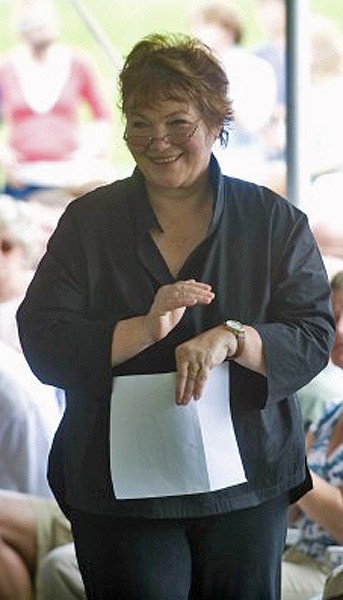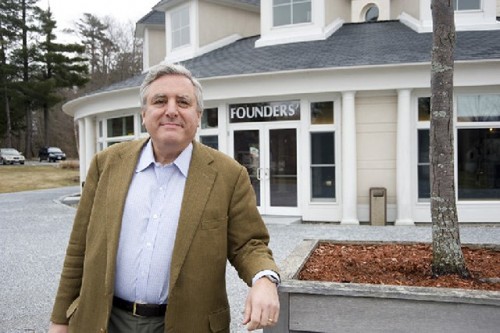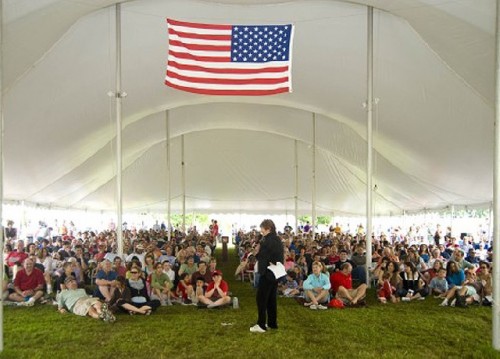Shakespeare & Company Faces Economic Storm Calmly, Creatively
Balances Cuts and Restructuring with Program and Revenue Growth
By: Larry Murray - Mar 17, 2009
Tina Packer and Shakespeare & Company have faced down a lot of adversity since they began thirty years ago. She and her supporters are building an institution that will outlive her. So as the dire economic news of the past six months revealed itself, she knew that action was essential to survival. Unlike some Berkshire institutions she did not put on a false front, pretending everything was fine. Working with her board and key staff the resourceful Packer has come up with an ingenious plan that is both practical and optimistic, announcing it in two distinct parts.
Two weeks ago BFA reported on plans for 2009-10, her most adventurous season ever, and today she revealed how her company is going to pull it off.
With that announcement of an 18-production season, (in 2008 there were 10) questions arose as to how such expansion could be financed. "Bare pipes and great acting," replied Tina, "because it's creativity that will see us through, Having less money to work with means making clever choices and cutting costs, while not compromising artistic creativity." Tina offers a fascinating case study of how successful arts organizations can respond to the current economic miasma without causing a panic in the process.
Packer is no stranger to management theory and practice. She co-authored, with John O. Whitney, a book called Power Plays: Shakespeare's Lessons in Leadership and Management. In his time, Shakespeare was quite a manager. He had to be. Tina and Will have that in common. Who knew we had a business leader hidden inside an artist?
Shakespeare & Company is an excellent example of the importance of the creative economy, with a plant and campus in Lenox that is valued near $10 million, and a $2.5 million yearly payroll, most earned through ticket sales and contracted educational programs in the schools and on their campus. Some of these are actually conducted in prisons using techniques she innovated.
So, on the heels of its announcement of an especially ambitious annual performance calendar, Shakespeare & Company has set in motion an aggressive plan to save costs, generate revenue, and take on the challenge of running an expanded year-round program in today's economic climate. "We are out to prove we are indeed the 'Creative Economy,'" said Packer, whose official title is Founding Artistic Director and President, "and by that I mean that we can be as creative in running our organization as we are on stage or in the rehearsal room."
"With the advent of our new Production and Performing Arts Center, we would be restructuring our administrative and sales force at this point anyway," Packer continues. "But with current economic fears and restraints, we must focus all our energies on running as lean an organization as possible, while getting out the message that Shakespeare & Company is a fascinating place to come to, whether you are an audience member, student, teacher, or artist."
More Programming and Ticket Revenues
This restructuring plan will enable the Company to carry out expanded programming across three theaters, conduct its Free Bankside Festival, and maintain its internationally renowned roster of education and actor training programs. The organization now has its performance doors open 12 months of the year, while also providing workshops for actors and teachers, and education programs which are conducted across the Northeast and also replicated around the country.
In addition, the Company is preparing to rent out its rich store of resources, from theatre spaces and rehearsal rooms to the most comprehensive inventory of sumptuous costume pieces and working weaponry in the Northeast. The annual budget has been trimmed from 5.6 million in 2008-2009 to $4.7 million in 2009-2010. The restructuring plan was announced today by Packer, Managing Director and CFO Nicholas J. Puma Jr. and Board of Trustees Chairman Richard Mescon.
"It's all about identifying the ways we can fulfill our mission while maximizing our income. When it comes to the experience we offer our patrons, or the joy in the faces of the students we work with, or the inspiration of the actors who come here from around the world to train—in short, our impact on our communities—we are proud of what we do, and think we do it very well. But now is the time to be absolutely certain we're also doing it as well as we can from a financial and organizational standpoint," says Packer.
Although the just-concluded 2008-2009 season earned Shakespeare & Company the highest box office revenue in its 32-year history, neither ticket sales nor fees from education and training programs alone are enough to keep the Company on the firmest financial footing. The amount of individual and corporate contributory support eroded in 2008 for Shakespeare & Company, as it did for many arts and other nonprofit organizations across the country.
Meanwhile, the Company still has $1.2 million to raise for the completion of its $10 million Capital Campaign to finance construction of the Company's new Production and Performing Arts Center. This new facility—including the Elayne P. Bernstein Theatre, three state-of-the-art rehearsal/performance studios, and enhanced production facilities—will prove a boon to revenues and artistic standards in the long term, but is susceptible to the general economic downturn Early indications are good for another strong season at the box office, but the Company is determined to place itself in a position where it can weather future financial challenges, both anticipated and unforeseen.
Layoffs and Pay Cuts
The restructuring plan includes seven employee layoffs, while other employees will shift to part-time or consulting roles, while still others will see their duties expand and evolve. A 10% across-the-board pay cut will take place for year-round employees.
The three Founders of Shakespeare & Company —Artistic Director Tina Packer, Director of Education Kevin G. Coleman and Director of Training Dennis Krausnick—are electing to forgo pay entirely for two months. "We felt it was the least we could do so that the cutbacks did not have to be more severe" says Coleman. "After all, this is our life's work and we personally have a strong vested interest in seeing that it gets passed on to the next generation."
Shakespeare & Company currently has 50 full-time employees, with an additional 15 teacher/actors working in schools from Lenox to Long Island. This group is then joined by some 150 artists, technicians, box office personnel and front-of-house staff for the summer season. "Much of the restructuring is about thinking in smarter ways," says Packer. "We have always made good use of artists who can be managers and teachers. Now we are looking at artists being in sales, having blogging abilities, thinking how to hook us up with the next generation."
A key feature of the restructuring of responsibilities and work-flow is the creation of a team that will focus on increased sales across the Company's operations, from box office ticket sales, to rental space for special functions, to attracting participants for the dozens of education and training programs the Company runs each year. In the past, sales people have sold workshops or tickets in a single department; now all personnel will sell all facets of the Company and be trained in all aspects of the Company's operations.
Renting and Leasing Services at PaPA
This team will also oversee rentals from the Company's vast stock of costumes, set pieces, and weaponry, as well as develop its capacity for custom-designed production services and building sets for other arts organizations. Additionally, as the advanced features available at the PaPA Center come on line, there are increased opportunities for rentals and special events. In the past six months, these have included IS183's "Hairball" fundraising gala last weekend, a runway fashion show hosted in partnership with Homeward Bound of Great Barrington, the Boston Symphony Orchestra's announcement of its Tanglewood season, several video production shoots, a performance by the Olga Dunn Dance Company, a Berkshire Creative SPARK! Function bringing together arts organizations from around the region, and the 2009 Shakespeare Theatre Association of America's professional conference, featuring 140 participants.
More Audiences, More Often
In keeping with this strategy, a theme of the upcoming season is "Life Laid Bare." With an eye on maximizing revenue while maintaining artistic excellence, some very successful productions will return in the upcoming season, such as Hamlet and Othello, which can be remounted with short rehearsal periods and already have sets and costumes available. There are three one-woman plays, expected to attract devoted audiences, and a series a modern plays (including U.S. premieres) which will have short runs and simple sets. The success of this diverse programming is dependant on patrons returning to the theatre again and again.
"People tell us they love coming to the property," says Packer. "We are going to attract them even more with musical interludes, food and drink, and youthful energy—something we can do because of our large youth following."
"We have one goal: to keep Shakespeare & Company's founding mission intact, while staying financially cautious, guarded, and flexible as we respond to economic realities," says Puma. "Some of these measures are painful and we wish we could avoid them. But others are exciting, as we aim for what could be truly our biggest and best season ever. Taken together, the action plan is necessary for our both our short and long-term fiscal health. We are gearing up to have a big year at the box office, and also to close out the remaining $1.2 million needed for our Capital Campaign. It will take lots of creative thinking and plenty of hard work, but those are things Shakespeare & Company has always excelled at."
Determined to increase revenue, the Company has announced an ambitious 2009-2010 season with expanded programming, including 18 full productions (versus 10 last year), a revamped lecture series, a roster of special events, the launch of an affordable "Lunchtime Shakespeare" performance, the addition of a first-ever December holiday production, a winter production that stretches from January to mid-March of 2010, and a celebration of Shakespeare's birthday (Will 445 Bash) coming up on April 23.
Last season, a soft opening made possible about 100 performances in the Elayne P. Bernstein theatre, from August through March; this season, the new theatre will host over 250. The bustling roster of programming will be executed with a smaller budget than the previous year's season, exploiting the Company's ability to tap into its store of intellectual, artistic and material resources.
About to launch its thirty-second season, Shakespeare & Company has grown into one of the largest Shakespeare festivals in North America and earned national and international recognition year after year, not only for its critically acclaimed performances but its inventive and award-winning Education and Training Programs. It was begun in 1978 with $3500 in the bank, playing outdoors at The Mount; last year over 50,000 patrons visited Shakespeare & Company during its 2008-2009 performance season and another 50,000 teachers, educators and students from the U.S and abroad were involved in its extensive programs. Each year, 200 professional actors take various workshops built around the Company's innovative training methodologies.
"I am determined the next 32 years will be about stabilizing our home here on Kemble Street, passing on the creative knowledge, and building the campus into a beautiful and practical place for visitors from the world over," says Packer.






